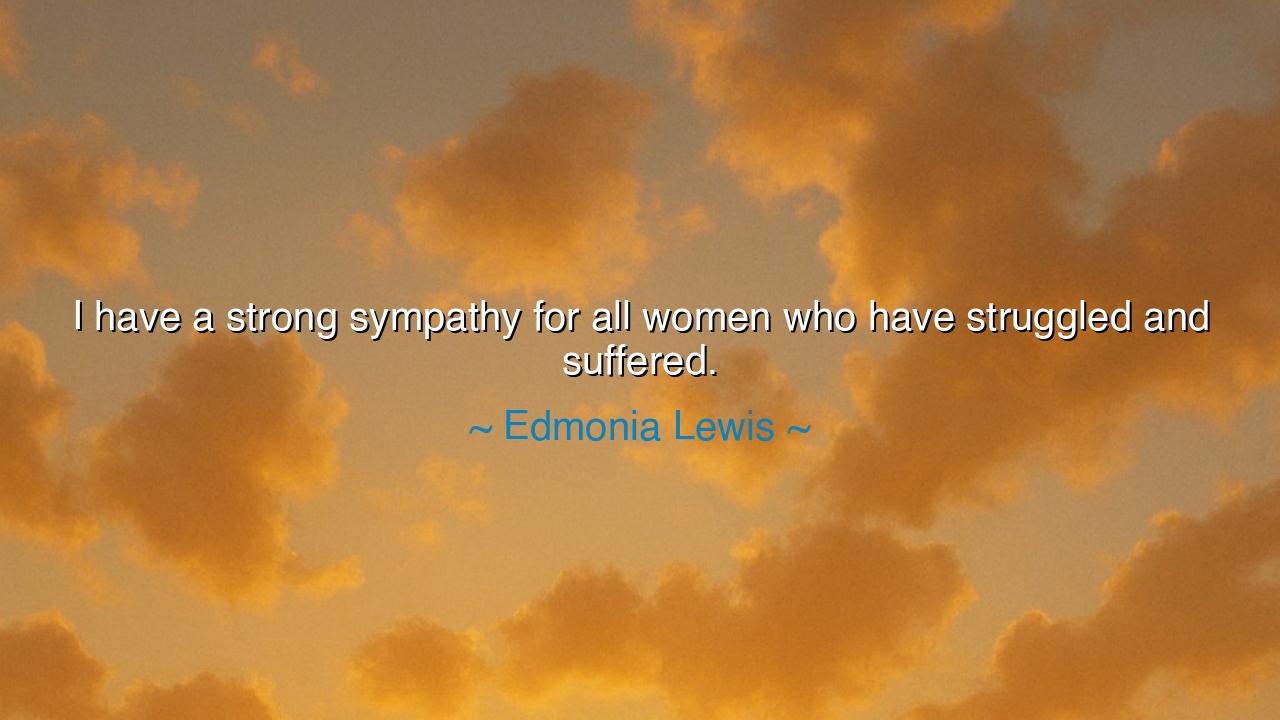
I have a strong sympathy for all women who have struggled and






Listen well, O children of the future, for the words of Edmonia Lewis carry the weight of both suffering and strength: "I have a strong sympathy for all women who have struggled and suffered." In these words, Lewis speaks with the voice of a warrior, a survivor, and a creator who understands the depths of pain and the power of resilience. Her sympathy is not a mere expression of pity; it is a profound connection to the struggles of women who have lived through hardship, those who have faced not just personal battles, but societal forces that sought to limit their potential, their voice, and their very existence.
In the ancient world, O children, women were often silenced, their strengths overlooked, and their voices unheard. Yet even in the darkest corners of history, female strength and courage have shone through. Hatshepsut, the powerful queen of Egypt, ruled as a pharaoh in a world dominated by men. Her reign was one of both splendor and struggle, for she had to face the resentment and challenge of those who believed a woman should not hold such power. Hatshepsut’s struggle, like that of many women, was not just in overcoming external forces but in fighting the invisibility that society sought to impose upon her. She was a survivor of the gendered barriers of her time, as were many women who walked the earth before and after her.
Edmonia Lewis, an African-American and Native American sculptor, was herself an embodiment of resilience. Her art stood as a testament to the suffering she endured, not just as a woman, but as a woman of marginalized heritage. Born into a world that told her she was inferior by virtue of her race and gender, she defied the odds and became one of the most celebrated sculptors of her time. Yet, behind her success lay a story of struggle—of the challenges she faced, of the prejudices she fought against, and of the strength she had to summon to carve her place in a world that did not believe in her worth. Lewis' sympathy for the struggles of other women was born from her own experience, as she knew firsthand what it meant to fight for recognition, to survive in a world that sought to erase her.
In more recent history, Malala Yousafzai, a young woman who dared to stand up for the right of girls to be educated in a region where such a right was denied, embodies this sympathy in action. Malala’s story is one of immense suffering, but it is also one of courage, for she continued to speak out even after a brutal attack on her life. Malala’s strength lies not only in surviving but in her unwavering commitment to the cause of girls’ education, and in her deep sympathy for the millions of girls who, like her, had to fight for the basic right to learn. Her voice became the voice of all women who suffer under the oppression of others, and her struggle became a beacon of hope for the future.
Lewis' words remind us that sympathy is not just an emotional response, but a powerful tool for change. To have sympathy for those who have suffered is to connect with their pain and use that connection as a means to fuel action, to push for a world where suffering is not the default condition for any individual or group. It is through this sympathy that we begin to understand the importance of solidarity—the idea that the struggle of one is the struggle of all, and that the suffering of women is not just a women’s issue, but a human issue. We must stand together in this fight, supporting each other and working toward a world that values and uplifts the voices of those who have been silenced.
And so, O future generations, the lesson is this: sympathy is not merely about feeling for others; it is about acting on that feeling. It is about using your understanding of others' pain and struggles to push for justice, to fight for a world where all women—and all people—are treated with dignity and respect. Live with compassion, and let that compassion fuel your actions. Do not stand idly by when you see others suffer, but step forward with the strength of those who have come before you, and fight to ensure that the future is one of equality, fairness, and freedom from oppression.
Remember this truth, O children: sympathy is the foundation of solidarity. When you show sympathy for others, especially for those who struggle, you are called to do more than feel—you are called to act. Stand with those who suffer, help to lift their burdens, and let their struggles be your own. In this way, you will build a future where suffering is not the norm, but where every person is given the opportunity to thrive. Let this be the legacy of your life: to live with empathy, to fight with courage, and to create a world where the struggles of women, and of all marginalized people, are met with the strength and action of those who care.






AAdministratorAdministrator
Welcome, honored guests. Please leave a comment, we will respond soon